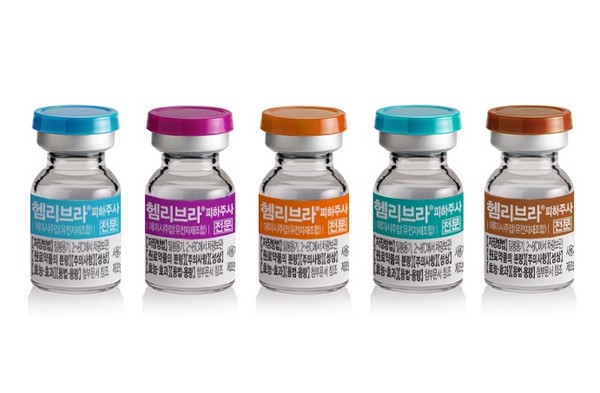The government said it would ease the immune tolerance induction (ITI) treatment criteria for hemophilia A drug Hemlibra Subcutaneous Injection (ingredient: emicizumab).
In January, the government expanded the reimbursement scope but added failure of ITI treatment as the criteria for reimbursement, which made it more difficult for pediatric patients to receive Hemlibra injections.

Parents of pediatric patients with hemophilia A, physicians, lawmakers, and the Anti-Corruption and Civil Rights Commission have been urging the government to revise the reimbursement criteria for Hemlibra.
On Wednesday, the Ministry of Health and Welfare said it would partially revise the criteria for health insurance benefits and that the revision would take effect on Sept. 1.
According to the revision, among the criteria for reimbursement for pediatric patients aged between one and 12, the government deleted cases where patients prove they cannot use ITI treatment through a doctor’s administration opinion letter and cases where antibodies reappeared after successful ITI treatment.
Previously, patients in those cases could not receive insurance benefits.
Instead, the government inserted cases where patients received bypass factor drugs three or more times in the past 24 weeks due to bleeding and those who failed ITI therapy.
To help doctors understand the safety of Hemlibra sufficiently and use it, the government also added “considerations for administration.”
Thus, if physicians judge that the clinical usefulness is higher than the risk cited in precautions, they need to fully explain to patients about the treatment, including ITI and the treatment’s association with Hemlibra administration.
Doctors should administer Hemlimbra only when they received consent from the patient or the guardian.
Doctors should also keep written explanations and consent forms in the medical record.
The government also changed the administration method. If a hospital confirms that a patient achieved at least one successful self-administration after receiving education on self-administration, the government will allow reimbursement for Hemlimbra for up to four weeks per hospital visit.
The prescription of Hemlibra will be eligible for insurance benefits only when the patient or the guardian kept records of the drug administration under the management of the medical institution.
The government also changed the criteria on who can prescribe Hemlibra. Physicians who have been seeing hemophilia patients “over a year or longer” can prescribe the drug instead of care “in the past year.”
In detail, the reimbursement for Hemlibra will be recognized if the drug was prescribed by pediatricians or hematologists-oncologists who have treated hemophilia for a year or longer or pediatricians and internal medicine specialists who have treated the disease for five years or more.
The health and welfare ministry changed the reimbursement criteria because it had to change the prerequisite for ITI treatment in patients aged between one and 12, based on local approval conditions, textbooks, clinical treatment guidelines, research literature, and opinions of related societies.

